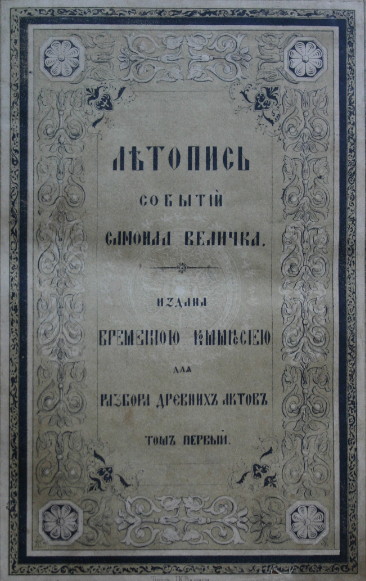Velychko, Samiilo
Velychko, Samiilo [Величко, Самійло; Velyčko, Samijlo], b 1670 in the Poltava region, d after 1728 in Zhuky, Poltava region. Cossack chronicler and political activist. He studied at the Kyiv Mohyla Academy and mastered the Latin, German, and Polish languages. He served as general secretary to Vasyl Kochubei in Dykanka, and in 1705 he transferred to the General Military Chancellery. He was relieved of his post after the execution of Kochubei in 1708; thereafter he lived in Zhuky, where he devoted himself to writing and teaching. He translated into Ukrainian the German anthology Cosmography, which he published with an introduction in 1728. Velychko's principal work was a chronicle (4 vols, 1720) describing the events of 1620–1700; it has not been preserved in full.
The first volume examines the events of 1648–59; the second volume, those of 1660–86; and the third, of 1687–1700. The fourth volume, the largest (2,041 pages), contains various documents from the 17th century. This first systematic history of the Cossack Hetman state refers to contemporary sources, Ukrainian (Samiilo Zorka's Diiariiush, Innokentii Gizel's Sinopsis, the works of Ioanikii Galiatovsky), Polish (Szymon Okolski, Samuel Twardowski), and German (Samuel von Puffendorf), and quotes from many documents. The first volume contains a number of distortions as well as plagiarisms from other histories. The second and third volumes are based on Velychko's personal observations and partly on documents of the General Military Chancellery.
Velychko's chronicle was written in the Ukrainian bookish language of the 18th century, with clearly discernible elements of dialect. Stylistically it is highly rhetorical and patriotic. In one place the author describes himself as ‘a true son and servant of Little Russia.’ Velychko paints a moving picture of the era of the Ruin, and he portrays the Cossacks as righteous defenders of Ukraine and Hetman Bohdan Khmelnytsky as a second Moses. The chronicle contains many anecdotes and stories that enhance its literary value. The manuscript was illustrated by 10 portraits of hetmans, from B. Khmelnytsky to Ivan Mazepa. Some historians, such as Mykola Kostomarov, Sergei Solovev, Mykhailo Maksymovych, Volodymyr Antonovych, Dmytro Bahalii, Orest Levytsky, and Pavlo Klepatsky, have considered Velychko's chronicle a reliable historiographical source; others, including Gennadii Karpov, Vladimir Ikonnikov, Mykola Petrovsky, Ivan Krypiakevych, and Oleksander Ohloblyn, have viewed with skepticism its stated sources, particularly the accounts of Samiilo Zorka.
The chronicle was published by the Kyiv Archeographic Commission as Letopis’ sobytii v Iugo-Zapadnoi Rossii v XVII v. (Chronicle of Events in Southwestern Russia in the 17th Century, 4 vols, 1848–64). The first volume was reprinted by the Archeographic Commission of the VUAN as Skazanie o voine kozatskoi s poliakami (Account of the Cossack War with the Poles, 1926). It was translated into contemporary Ukrainian by Valerii Shevchuk and published in the journal Kyïv (1986, nos 10–11 and 1987, nos 1–5, 7, 10, 12; with an introduction by Volodymyr Krekoten) and separately (2 vols, 1991). A new academic edition of the chronicle, under the title Samiilo Velychko Litopys, edited by Hennadii Boriak and Tatiana Tairova-Yakovleva, was published in Kyiv in 2020.
BIBLIOGRAPHY
Ikonnikov, Vladimir. Opyt russkoi istoriografii, vol 2 (Kyiv 1908)
Doroshenko, Dmytro. Ohliad ukraïns’koï istoriohrafiï (Prague 1923)
Petrovs’kyi, Mykola. ‘Psevdo-diiariiush Samiila Zorky,’ ZIFV, 17 (1928)
Marchenko, M. Ukraïns’ka istoriohrafiia: Z davnikh chasiv do seredyny XIX st. (Kyiv 1959)
Dzyra, Iaroslav. ‘Tvorchist’ Shevchenka i litopys Velychka,’ Vitchyzna, 1962, no. 5
———., ’Samiilo Velychko ta ioho litopys,’ in Istoriohrafichni doslidzhennia v Ukraïns’kii RSR, 4 (Kyiv 1971)
Arkadii Zhukovsky
[This article was updated in 2020.]
.jpg)

.jpg)
.jpg)